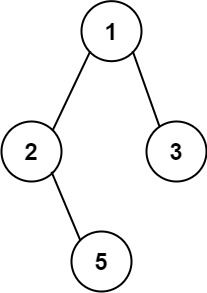Given the root of a binary tree, return all root-to-leaf paths in any order.
A leaf is a node with no children.
Example 1:
Input: root = [1,2,3,null,5] Output: ["1->2->5","1->3"]
Example 2:
Input: root = [1] Output: ["1"]
Constraints:
- The number of nodes in the tree is in the range
[1, 100]. -100 <= Node.val <= 100
# Definition for a binary tree node.
# class TreeNode:
# def __init__(self, x):
# self.val = x
# self.left = None
# self.right = None
class Solution:
def binaryTreePaths(self, root: TreeNode) -> List[str]:
def dfs(root):
if root is None:
return
path.append(str(root.val))
if root.left is None and root.right is None:
res.append("->".join(path))
dfs(root.left)
dfs(root.right)
path.pop()
res = []
path = []
dfs(root)
return res/**
* Definition for a binary tree node.
* public class TreeNode {
* int val;
* TreeNode left;
* TreeNode right;
* TreeNode(int x) { val = x; }
* }
*/
class Solution {
private List<String> res;
private List<String> path;
public List<String> binaryTreePaths(TreeNode root) {
if (root == null) return Collections.emptyList();
res = new ArrayList<>();
path = new ArrayList<>();
dfs(root);
return res;
}
private void dfs(TreeNode root) {
if (root == null) return;
path.add(String.valueOf(root.val));
if (root.left == null && root.right == null) {
res.add(String.join("->", path));
}
dfs(root.left);
dfs(root.right);
path.remove(path.size() - 1);
}
}
